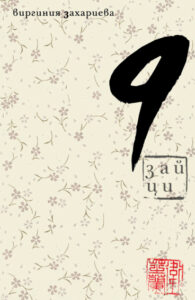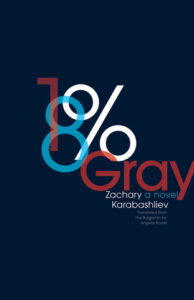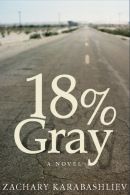The by far most important institution involved in promoting Bulgarian literature in the English-speaking world is the Elizabeth Kostova Foundation. I (TH) am extremely grateful to its Managing Director Milena Deleva (MD), for being so kind to agree to this interview despite her very busy schedule.
TH: Milena, most readers know probably Elizabeth Kostova at least by name. But what is the story behind the Elizabeth Kostova Foundation (EKF)?
MD: The Elizabeth Kostova Foundation (EKF) was established by the American author Elizabeth Kostova who after spending time traveling and researching in Bulgaria, has published a very successful debut novel “The Historian” and has made a generous and cultured gesture to repay a debt to the country she considered inspiration for her novel, by establishing a literary Foundation.
With that said, the Elizabeth Kostova Foundation was established back in 2007 in Bulgaria to promote and support contemporary Bulgarian literature. In 2016 we incorporated 501(c)3 in the US and our mission expanded.
Our work creates a literary nexus between Bulgaria and the United States by providing opportunities for Bulgarian authors and translators in Bulgaria and in the English speaking world, and by putting cultural diplomacy in practice.
Looking back at an entire decade, EKF has added Bulgaria to the Anglophone literary map and has launched many pioneering initiatives such as, creative writing workshops for American and Bulgarian writers, creative writing workshops for high school students, publication of Bulgarian novels in English, Fellowships for Bulgarian literary translators in the US and the UK, Translation Award, Translator Atelier, Curated literary reading series in the US, Literary festivals in the US and in Bulgaria. We also originated the Contemporary Bulgarian Writers website.
The combination of all these activities and many unplanned “spillovers” helped the contemporary Bulgarian writers enter the international literary circuit.
TH: Maybe you can tell our readers a few words about your own background and your practical work at the EKF?
MD: Compared to my academic background, I hold MA in Cultural Studies from Sofia University, my work is way more practical. It does have to do with very tangible and actual results such as published books, among other literary publications, as well as other accomplished projects. I also hold MA in Arts Administration from Baruch College in New York. Nowadays, in America, unlike Europe where the notion for civil society is still stronger, nonprofits have to justify their work by breaking society in smaller, often imagined communities. Ironically, these don’t always perceive themselves as such, and the entire community rhetoric becomes a class issue. In this regard, our case is unique. With our work in the US we don’t aim at specific group of people, we aim at the global reader and are looking for creative cross-exposure between generations, established – emerging, local – foreign but also literary – non-literary. In this way, we have been able to cultivate new readership, and this is what is the real uphill battle.
In Bulgaria, we focus on creating professional opportunities for writers and translators, and nurturing context and literary communities, in addition to broadening the audience.
My specific and overarching work is hybrid. I often run projects from inception to completion, planning, programming, producing and securing grants for our programs. Being proactive and looking for opportunities for our main constituencies, including communication are also very important aspects of my job.
TH: According to the Three Percent Database of the University of Rochester, only about three percent of the newly published books in English language are translations, and if we only consider literary fiction, the figures are even smaller. What is on the bottom of this – a lack of interest from the side of the readers, or are publishers shying away from translations for other reasons? Do books by Bulgarian authors face particular obstacles to find a publisher in the English-speaking world?
MD: Yes, according to Bowker company, based on 2004 data, the fiction slice was less than 1% at the time the survey was announced.
Well, some publishers aren’t shying away from translations because this is what they specialize in, international literature is their sole profile. Some of them are profit, others are incorporated as nonprofit organizations. Regardless of their legal status, normally they publish about ten titles per year, which perhaps corresponds to different variables – the demand, the number of staff, the financial means. Let’s not forget that both Knausgård and Bolaño were discovered by small publishing houses.
However, there are bigger commercial publishers who also acquire translations along with their Anglophone titles. There is a handful of Bulgarian writers who have been published by big publishing houses, two of the three write in English.
Bulgarian books do face numerous default obstacles. First of all, Bulgaria as a country doesn’t have any distinct international presence, then there is inconsistent or no state support at all. In fact, if there are any good news or breakthroughs connected to my homeland in the recent years, they’ve mostly come from arts and culture sphere (not just literature).
Consequently, there aren’t foreign literary agents enticed by representing Bulgarians, nor enough translators who are qualified to translate from Bulgarian to English. I am mentioning the former for two reasons. The translators are not only moving literature from one language to another, they, in many cases, serve as literary agents for international literature.
That is why our Sozopol Fiction Seminars are so important, they create supportive environment and contacts between Bulgarian authors and translators and Anglophone editors and publishers.
This makes our efforts even more important.
The current moment is a turning point for translated literature because many organizations have undertaken advocacy not only through publishing, but also by organizing book tours with international writers, encouraging international literature in the curriculum, and other initiatives such as involving booksellers who do the floor work. We have also organized classroom visits of Bulgarian authors to colleges in New York because the point is how do we establish and maintain literary culture that is friendly to international literature. It is not enough to publish it, the real challenge is to connect it with the ordinary reader. And hopefully, one day soon, have it reach its readership as any other quality literature.
TH: You have established a cooperation with Vagabond, a Bulgarian English-language periodical with high quality content, and also with Open Letter Books, the University Press of the University of Rochester. Can you tell us a few words about these corporations?
MD: Yes, these are our structured and organized partnerships that ensure small but firm flow of Bulgarian literature into the Anglosphere. With Open Letter Books we co-run an annual residency for one Bulgarian translator to spend three weeks in Rochester, working with the Press to refine their current translations, visiting Translation Studies workshops at the University of Rochester. Also, we co-run an annual novel contest, mentioned above.
Vagabond English Monthly provides a platform for a joint presence of the Bulgarian and the English language fellows at the Sozopol Fiction Seminars.
TH: My own perception as someone who lives in the country since 18 years is that nowadays there is a much bigger interest in contemporary Bulgarian literature among Bulgarian readers than was the case when I came to the country first. Apart from this increase in literary output, what has changed in Bulgarian literature in the last two decades?
MD: Yes, for many years, during the transition, home grown writers were sidelined by commercial foreign authors. The game has changed and more novels have been written and published.
More novels have been adopted for the screen or the stage. Novels are discussed on the National television. There are more opportunities for Bulgarian writers to travel and visit international forums. Living Bulgarian writers have entered the school curriculum.
TH: From my experience as a reader of Bulgarian literature in the original language, I get the feeling that a comparatively big number of authors write about topics that seem to be very specifically Bulgarian. Other authors seem to write more in a way that targets not primarily or exclusively a Bulgarian audience. In general I see attempts to become perceived as less “provincial”, compared to what is considered as “contemporary” writing. This goes together with a growing interest from the side of (potential) authors to attend creative writing courses. While this aims at learning the craftsmanship necessary to become an author, my fear is (maybe unjustified) that this may lead to a kind of mainstream literature that is written according to certain standards, but is sometimes lacking a certain freshness. It would be extremely interesting for me to hear a bit more about your experiences with the Sozopol Fiction Seminars the EKF is organizing every year.
MD: I guess the fear from uniform writing is a legitimate one. Very rarely we happen to host American authors who come outside of the MFA programs in creative writing. Even the critics of the MFA system hold a degree from one of the 229 programs in the country (source: Association of Writers and Writing Programs). According to the same data, there is a steady increase in non-academic jobs for writers. In Bulgaria, many writers earn their living in the commercial sphere. This only proves that writing is a fundamental and a transferable skill.
It is one of the reasons why we launched creative writing workshops for high school students, open to teens with interest for writing but not necessarily looking to become writers. Everybody can only benefit from writing well.
Back to the pivotal Sozopol Fiction Seminars…
Our workshop model provides safe space for peer reflection on works in progress and often the instructors themselves offer their own work on the discussion table. Bulgarian workshops are facilitated by Bulgarian writers, Anglophone workshops are facilitated by English language writers. The two groups have opportunity to share their works during one joint workshop session and also during the public readings. This non-didactic structure supports diverse writing aesthetics and styles.
TH: Bulgaria is a small book market with a quite big number of authors who are competing to get the readers’ attention. In terms of, let’s call it “literature infrastructure” that is important for authors, what is the situation in Bulgaria? I would particularly like to know what is your opinion regarding the official policy of the state regarding the promotion of Bulgarian literature (translation grants, residencies, participation in book fairs, etc.)? To me it seems that the main work to promote Bulgarian literature abroad is done by EKF and a few other programs, such as Traduki, and by some courageous publishers – but maybe my perception is wrong?
MD: Unfortunately, your perception isn’t wrong. There are exception and in fact cultivating government officials or introducing them to literature is a bit like cultivating donors but much harder.
The rant about the poor Bulgarian presence at book fairs, the high VAT for books, the limited number of diplomats who realize the role of culture in branding Bulgaria would be a very long one, and it is worth a separate discussion, preferably in Bulgarian language.
It will be extremely helpful if the state recognizes our efforts and supports initiatives like ours more consistently. It will be of mutual benefit because to a certain extent we do the state’s job. Even if we cease to exist some of the good outcomes of our work are irreversible but the literary noise needs to be maintained.
TH: One of the – possible – bottlenecks to see more Bulgarian books translated is the availability of good translators. There are quite a few, and especially Angela Rodel has been instrumental to make Bulgarian literature available to the English-reading audience. Are there any interesting talents among the young translators that are not so well-known yet? How is EKF supporting the translators?
MD: Yes, Angela Rodel has translated two thirds of the novels published within our programs in the UK and in the US. However, we are trying to encourage other translators to choose literary translation as a professional path.
We do this through regular programs, those that are designed to directly support translators are:
Translators Atelier in Sofia, conducted in collaboration with the Bulgarian Translators’ Union as an opportunity for translators to master the art of translation of different fiction genres and language directions.
Translation Residency, an opportunity for one Bulgarian translator to work in one of the premier American publishers of translated literature and workshop their translation with the students of the Translation Studies program at the University of Rochester.
As mentioned before we co-run this program with Open Letter Books, and in 2017 have launched a similar residency at the Norwich Writer’s Center in UK.
Krastan Dyankov Translation Award, a prize given annually for an outstanding translation of a work of contemporary literary fiction from English into Bulgarian.
In addition, EKF’s work creates many other spillovers for translators who have done some work for our programs but can independently submit their work to publications. Also, there are several Bulgarian features / issues, resulting by our activities, for example Drunken Boat, Words Without Borders, Ninth Letter, EuropeNow and there are many more magazines, which have published work by Bulgarian authors and reviews about Bulgarian books as a direct result from encounters in Sozopol.
TH: Is there a book by a Bulgarian author upcoming in English translation at this moment?
MD: The Same Night Awaits Us by Hristo Karastoyanov is the most recent book, published within our programs (January, 2018).
TH: The last question is maybe a bit difficult to answer for you; in your professional quality as director of the Elizabeth Kostova Foundation, you have to be impartial – but as a reader, I would like to know which is/are the untranslated Bulgarian book(s) you would love to see published in English soon?
MD: Ivailo Petrov, Преди да се родя и след това (Before I was born and thereafter).
I hope that after the beautiful work on Wolf Hunt, Archipelago will publish his other iconic novel as well.
TH: Thank you for this interview, Milena! Благодаря!
This interview was first published at Global Literature in Libraries Initiative, 01 June, 2018 for #BulgarianLiteratureMonth.
© Milena Deleva, 2018 © Global Literature in Libraries Initiative, 2018 © Thomas Hübner and Mytwostotinki, 2014-8. Unauthorized use and/or duplication of this material without expressed and written permission from this blog’s author and/or owner is strictly prohibited. Excerpts and links may be used, provided that full and clear credit is given to Thomas Hübner and Mytwostotinki with appropriate and specific direction to the original content.







 Facebook
Facebook RSS
RSS Twitter
Twitter